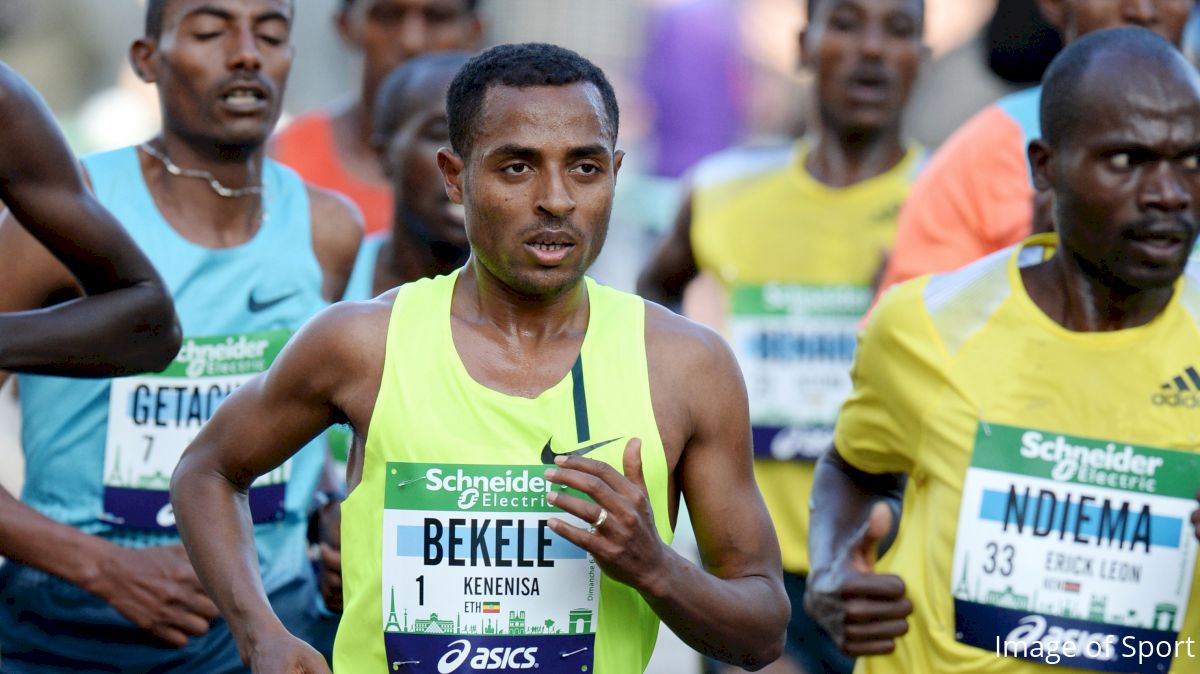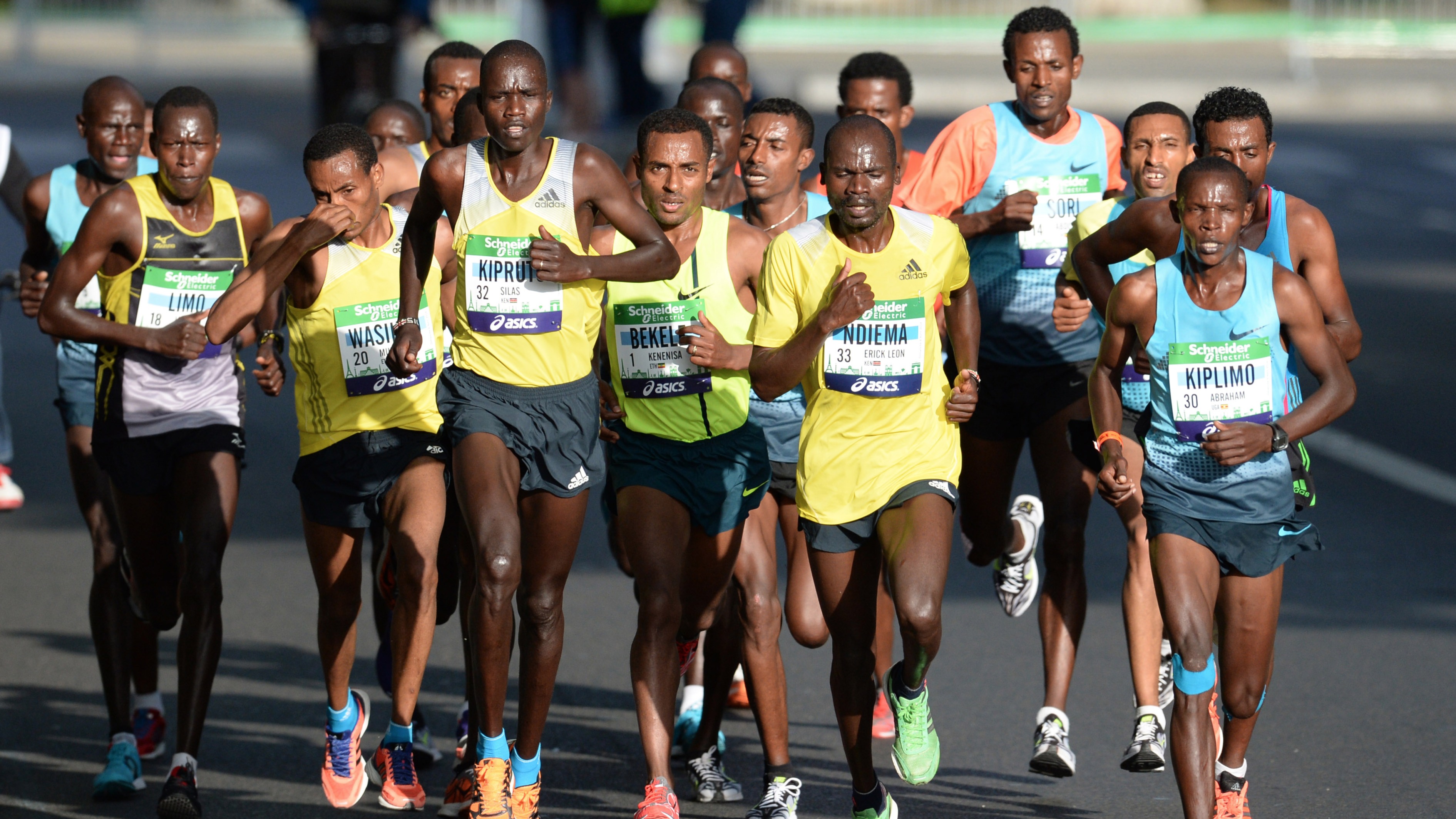Can Bekele Still Find Form in the Marathon?
Can Bekele Still Find Form in the Marathon?
By Toni ReavisA new era in marathon running began in 2008 when Sammy Wanjiru won the Beijing Olympics in record time with an all-out blitz from the gun on a

By Toni Reavis
A new era in marathon running began in 2008 when Sammy Wanjiru won the Beijing Olympics in record time with an all-out blitz from the gun on a warm, humid day. That brash performance took traditional marathon running by storm, and introduced an attack style of racing previously considered unthinkable or foolhardy.
Two years later, another revolution seemed to be at hand when Patrick Makau beat Kenyan countryman Geoffrey Mutai in both Rotterdam and Berlin, winning by scant seconds on each occasion in very quick times. Though Mutai emerged from Makau's shadow in 2011 with course-record wins in Boston (2:03:02 — the fastest time ever, though the downhill terrain negated the world record) and NYC (2:05:37), it was Makau who nabbed the official marathon world record in Berlin 2011 (2:03:38).
Makau's record was eclipsed by Wilson Kipsang's 2:03:23 in Berlin 2013, which was bettered a year later by Dennis Kimetto's standing mark of 2:02:57 in Berlin 2014. What made this look like something new was these men didn't come up through the ranks as track racers over the 5000 or 10,000 meters. Instead, they dabbled in track and focused their careers on the half marathon and marathon to follow the money as it transferred from the tartan to the tarmac. Huge participation numbers made the marathon the showpiece event, which increased the purse prizes.
This Sunday, former 5000m world champion (Paris 2003) Eliud Kipchoge will defend his London Marathon title and world lead against a powerhouse field of marathon specialists that includes Kipsang and Kimetto as well as the current 5000m and 10,000m world record-holder Kenenisa Bekele of Ethiopia. To date, the 33-year-old's results over 26.2 miles indicate his body has not been able to withstand the increased load required of the marathon. His last start was in Dubai 2014, when he dropped out at mile 18 with balky hamstrings in both legs. Later, he couldn't overcome an Achilles tendon problem that carried over from track and cross country and failed to reach the London 2015 starting line. This will be his fourth marathon start.

But before we suggest the marathon might be a step too far for Bekele, let’s look at how he compares to his track-focused predecessors who later moved up to the marathon with great success.
Former 5000m and 10,000m world record-holder and five-time world cross country champion Paul Tergat of Kenya ran his debut marathon in London 2001 at age 31, where he took second in 2:08:15. He didn’t notch his first win until his sixth marathon in Berlin 2003 at age 34, which is when he set the former world record at 2:04:55. In all, Tergat ran 13 marathons and took three wins, including his final race in Lake Biwa, Japan, in 2009.
The man who broke Tergat’s world records in the 5000m and 10,000m (as well as his heart in two Olympics), Haile Gebrselassie of Ethiopia debuted at the 2002 London Marathon. He famously finished third in 2:06:15 behind then-world-record-holder Khalid Khannouchi (2:05:38) and rival Tergat (2:05:48) in one of history’s most thrilling races.
Geb won his next marathon in Amsterdam in 2005 (2:06:20), but didn’t secure his first of two world records until his seventh marathon in Berlin 2007 (2:04:26) at age 34. He bettered his own time the following year in Berlin at 35 years old with a 2:03:59. In all, he took part in 17 marathons, notched nine wins, and dropped out in four of his last five starts, including his final one in London 2014.
Paul Tergat’s track career began in 1993 when he was 24, and concluded eight years later when he won the silver medal in the 10,000m against Geb in Sydney, Australia. Geb’s own oval history began in 1992 at age 19, and he competed on the track until 2004 in the 5000m, and until 2008 in the 10,000m. Unlike Tergat and Bekele, Geb didn't run cross country year in and year out. And with Bekele able to double at 4K and 12K from 2002 to 2006, he put even more wear on his body than Tergat, who only had the 12K to win in the 1990s.
In the past, the marathon was the destination for those who couldn't finish fast enough on the track to earn medals — Derek Clayton, Frank Shorter, Bill Rodgers, Alberto Salazar, Rob de Castella, and Steve Jones. Today, a platoon of young marathon specialists show little interest in exploring what few opportunities still exist on the track. Instead, they follow the money to the marathon, where they race fearlessly on fresh legs and unbridled confidence.
Now, one of the most intriguing questions facing the field this Sunday in London is whether one of the greatest track and cross country runners in history can make the leap to the next level. His predecessors' success suggests that Bekele at age 33 still has time to make his mark on the marathon if his mind and body can tolerate the longer training required. We know the man can race, but it will take more than tactics to win in London this weekend.
A new era in marathon running began in 2008 when Sammy Wanjiru won the Beijing Olympics in record time with an all-out blitz from the gun on a warm, humid day. That brash performance took traditional marathon running by storm, and introduced an attack style of racing previously considered unthinkable or foolhardy.
Two years later, another revolution seemed to be at hand when Patrick Makau beat Kenyan countryman Geoffrey Mutai in both Rotterdam and Berlin, winning by scant seconds on each occasion in very quick times. Though Mutai emerged from Makau's shadow in 2011 with course-record wins in Boston (2:03:02 — the fastest time ever, though the downhill terrain negated the world record) and NYC (2:05:37), it was Makau who nabbed the official marathon world record in Berlin 2011 (2:03:38).
Makau's record was eclipsed by Wilson Kipsang's 2:03:23 in Berlin 2013, which was bettered a year later by Dennis Kimetto's standing mark of 2:02:57 in Berlin 2014. What made this look like something new was these men didn't come up through the ranks as track racers over the 5000 or 10,000 meters. Instead, they dabbled in track and focused their careers on the half marathon and marathon to follow the money as it transferred from the tartan to the tarmac. Huge participation numbers made the marathon the showpiece event, which increased the purse prizes.
This Sunday, former 5000m world champion (Paris 2003) Eliud Kipchoge will defend his London Marathon title and world lead against a powerhouse field of marathon specialists that includes Kipsang and Kimetto as well as the current 5000m and 10,000m world record-holder Kenenisa Bekele of Ethiopia. To date, the 33-year-old's results over 26.2 miles indicate his body has not been able to withstand the increased load required of the marathon. His last start was in Dubai 2014, when he dropped out at mile 18 with balky hamstrings in both legs. Later, he couldn't overcome an Achilles tendon problem that carried over from track and cross country and failed to reach the London 2015 starting line. This will be his fourth marathon start.

But before we suggest the marathon might be a step too far for Bekele, let’s look at how he compares to his track-focused predecessors who later moved up to the marathon with great success.
Former 5000m and 10,000m world record-holder and five-time world cross country champion Paul Tergat of Kenya ran his debut marathon in London 2001 at age 31, where he took second in 2:08:15. He didn’t notch his first win until his sixth marathon in Berlin 2003 at age 34, which is when he set the former world record at 2:04:55. In all, Tergat ran 13 marathons and took three wins, including his final race in Lake Biwa, Japan, in 2009.
The man who broke Tergat’s world records in the 5000m and 10,000m (as well as his heart in two Olympics), Haile Gebrselassie of Ethiopia debuted at the 2002 London Marathon. He famously finished third in 2:06:15 behind then-world-record-holder Khalid Khannouchi (2:05:38) and rival Tergat (2:05:48) in one of history’s most thrilling races.
Geb won his next marathon in Amsterdam in 2005 (2:06:20), but didn’t secure his first of two world records until his seventh marathon in Berlin 2007 (2:04:26) at age 34. He bettered his own time the following year in Berlin at 35 years old with a 2:03:59. In all, he took part in 17 marathons, notched nine wins, and dropped out in four of his last five starts, including his final one in London 2014.
Paul Tergat’s track career began in 1993 when he was 24, and concluded eight years later when he won the silver medal in the 10,000m against Geb in Sydney, Australia. Geb’s own oval history began in 1992 at age 19, and he competed on the track until 2004 in the 5000m, and until 2008 in the 10,000m. Unlike Tergat and Bekele, Geb didn't run cross country year in and year out. And with Bekele able to double at 4K and 12K from 2002 to 2006, he put even more wear on his body than Tergat, who only had the 12K to win in the 1990s.
In the past, the marathon was the destination for those who couldn't finish fast enough on the track to earn medals — Derek Clayton, Frank Shorter, Bill Rodgers, Alberto Salazar, Rob de Castella, and Steve Jones. Today, a platoon of young marathon specialists show little interest in exploring what few opportunities still exist on the track. Instead, they follow the money to the marathon, where they race fearlessly on fresh legs and unbridled confidence.
Now, one of the most intriguing questions facing the field this Sunday in London is whether one of the greatest track and cross country runners in history can make the leap to the next level. His predecessors' success suggests that Bekele at age 33 still has time to make his mark on the marathon if his mind and body can tolerate the longer training required. We know the man can race, but it will take more than tactics to win in London this weekend.